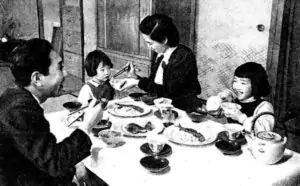 Gender roles in any country is complicated to explain. In Japan, however, it might be more complex than other nations. This is due to the amount of gender-fluid ideas that have coursed through its history. From even old times, Japan did not disdain homosexual behaviour, and even considered it normal as a phase in someone’s life. Also, the appearance of men and women can sometimes be difficult to discern, as many products and styles are shared by both men and women in Japan. Thus, in order to understand more about Japan’s gender roles, the following paragraphs will be dedicated to describing the way Japanese society, over time, perceived the roles of women and men.
Gender roles in any country is complicated to explain. In Japan, however, it might be more complex than other nations. This is due to the amount of gender-fluid ideas that have coursed through its history. From even old times, Japan did not disdain homosexual behaviour, and even considered it normal as a phase in someone’s life. Also, the appearance of men and women can sometimes be difficult to discern, as many products and styles are shared by both men and women in Japan. Thus, in order to understand more about Japan’s gender roles, the following paragraphs will be dedicated to describing the way Japanese society, over time, perceived the roles of women and men.

✅ AI Essay Writer ✅ AI Detector ✅ Plagchecker ✅ Paraphraser
✅ Summarizer ✅ Citation Generator
Before the times of Confucian concepts being introduced in Japan, the country was fairly liberal about its gender roles. You could say the treatment of men and women were equal, and male sexuality was modern in terms of western standards. According to The Independent, “In premodern Japan, aristocrats often pursued male and female lovers; their sexual trysts were the stuff of classical literature. To them, the biological sex of their pursuits was often less important than the objective: transcendent beauty. And while many samurai and shoguns had a primary wife for the purposes of procreation and political alliances, they enjoyed numerous liaisons with younger male lovers” (Robertson, Jennifer). As you can see, romantic pursuits were rather fluid and free, especially among men. The same article continued on this topic, “It’s important to note that, until very recently, sexual acts in Japan were not linked to sexual identity. In other words, men who had sex with men and women who had sex with women did not consider themselves gay or lesbian. Sexual orientation was neither political nor politicised in Japan until recently, when a gay identity emerged in the context of HIV/AIDS activism in the 1990s” (Robertson, Jennifer). Thus, Japan had a much different view on what was acceptable for men and women in terms of sexual relations. Homesexual acts were more associated with a phase of one’s life rather than an identity.
After Confucian ideas took hold in Japan, a more hieratical society emerged that had men at the top, and more defined gender roles in consequence. As Japan Powered states, “Men were expected to be loyal to their lords; women were to be loyal to their family and husband. Interestingly, women could own and inherit property and family position in feudal Japan. They were expected to control the household budget and household decisions to allow men to serve their lord” (Rafael, et al). However, when World War II came around, gender roles shifted again. Japan Powered says that, “The war also sharply divided gender roles, much to the detriment of women. Women’s patriotic duty was to have children. They were encouraged by propaganda to be married to the nation” (Rafael, et al). This notion went to great extremes, as women were sent into war zones as prostitutes to pleasure soldiers, as it was thought that men are not battle-ready if they are not having intercourse consistently. For the women that stayed home and who were not drafted, they were told to stay chaste. This is quite a degradation of the ease of gender roles in Japan’s past.
At present in Japan, the roles of women and men are becoming more and more blurred due to women increasingly working in offices. Men do not know if they need to keep the macho, tough guy attitude they are accustomed to having, or take a more androgynous perspective on gender roles. Most Japanese men, though, seem to be convinced that they need to work harder than women and act manly in order to keep a defined gender despite women working alongside them in equal positions or even higher positions (The Japan Times). In effect, the modern Japanese man feels emasculated and is in search of a new identity, or is clinging to a faded tradition.
Japanese gender roles began as a fluid and open exploration of what it means to be a man or woman. Over time, though, through the introduction of Confucian ideas and World War II, Japanese society formed more solidified gender roles. These perspectives are now on the brink of collapsing under the weight of economic adaptation.
Works Cited
Rafael, et al. “A Look at Gender Expectations in Japanese Society.” Japan Powered, 23 May 2016, www.japanpowered.com/japan-culture/a-look-at-gender-expectations-in-japanese-society.
Robertson, Jennifer. “Japan’s History of Gender.” The Independent, Independent Digital News and Media, 6 Mar. 2017, www.independent.co.uk/life-style/fashion/japan-s-history-of-gender-a7607311.html.
“Modern Japanese Men Dogged by Stoic Salaryman Stereotype.” The Japan Times, www.japantimes.co.jp/news/2016/12/27/national/social-issues/modern-japanese-men-dogged-stoic-salaryman-stereotype/#.W6itr59fjCI.
Follow us on Reddit for more insights and updates.





Comments (0)
Welcome to A*Help comments!
We’re all about debate and discussion at A*Help.
We value the diverse opinions of users, so you may find points of view that you don’t agree with. And that’s cool. However, there are certain things we’re not OK with: attempts to manipulate our data in any way, for example, or the posting of discriminative, offensive, hateful, or disparaging material.